
Fast, affordable Internet access for all.

As the municipal broadband movement continues to gain momentum, we created a new fact sheet to highlight the dramatic surge in the number of communities building publicly-owned, locally controlled high-speed Internet infrastructure over the last three years.
In January, we announced our updated tally of municipal broadband networks across the U.S., which showed that between January 2021 and January 2024 at least 47 new municipal networks had been lit up for service.
Our census of new municipal broadband networks comes while dozens of other projects are still in the planning or pre-construction phase, which includes the possibility of building 40 new municipal networks in California alone.
The new fact sheet not only contains pertinent numbers to illustrate the rising tide of municipal broadband networks, it also includes snapshots of four recently launched networks now providing service to communities hungry for high-quality Internet connectivity and competitive choice.
You can find the new Rising Tide of Municipal Broadband fact sheet here.
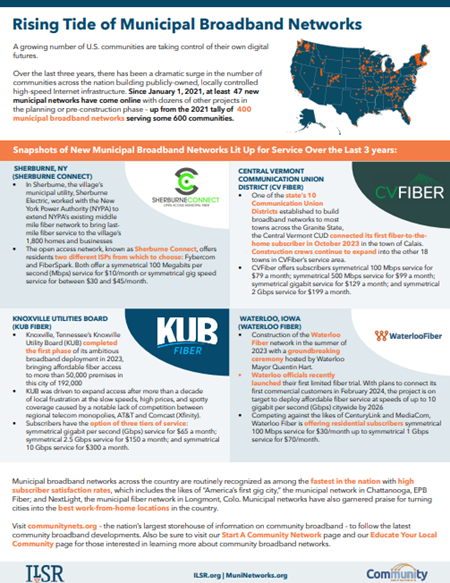
Community Broadband Resource Pairing
Since it first broke ground in 2014, Longmont, Colorado’s community-owned NextLight fiber network has won numerous awards and inspired countless communities nationwide.
With its citywide deployment nearing completion, and counterproductive state legal restrictions in the rear view mirror, city leaders are now working to expand the network beyond city limits.
City officials tell ILSR that network construction has now crossed north of Colorado Highway 66, outside of city limits and into the Anhawa and Strawberry Circle neighborhoods. The extension will bring service to around 125 homes that previously had access to Longmont electrical utility service, but not broadband.
Longmont officials say this latest expansion is being financed entirely by subscriber revenues and money set aside for capital projects, with no bonding or other supplementary funds involved.
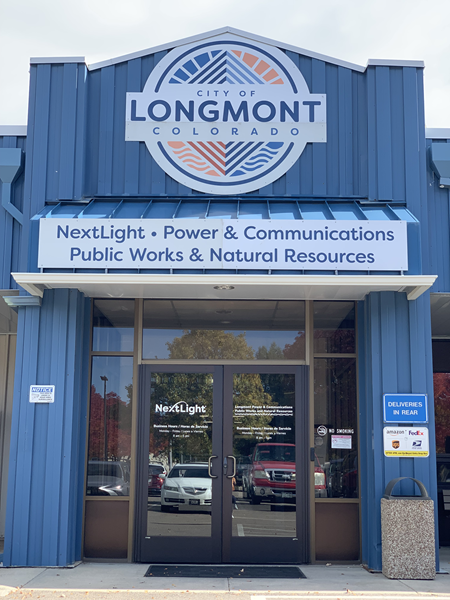
“We’ve been carefully evaluating our opportunities for expansion in order to make best use of the community’s resources,” NextLight’s Scott Rochat told ILSR. “Our total investment in this project is just under $300,000; based on our typical rate of adoption, we expect to see about a five-year payback. This also has the benefit of giving us a foothold on the north side of (Highway) 66 to help facilitate more expansion in the future.”
In a recently published piece in The American Prospect, Sean Gonsalves, ILSR's Community Broadband Networks Initiative Associate Director for Communications, reports on four cities across the U.S. that are well prepared to deal with the demise of the Affordable Connectivity Program (ACP).
The article – titled "The Municipal Broadband Solution" – begins by laying out why Congress created the popular program and how letting the ACP go bankrupt undermines the national "Internet For All" Initiative now underway. However, while digital equity advocates across the nation rightly lament the demise of the program, the focus of the article is on cities that have figured out how to deliver afforable high-quality Internet access even without the ACP.
Here's a few excerpts:
Congress created the ACP to soften a harsh reality: Americans pay among the highest prices for broadband of any developed nation in the world, leaving tens of millions unable to afford internet service—something experts have long noted is a telltale sign of a broken market dominated by monopoly providers, and is at the very heart of why the U.S. digital divide is as massive as it is.
However, although federal lawmakers have known for over a year that the fund would be bankrupt by this spring, GOP congressional leaders have not budged on even bipartisan attempts to save the ACP, prompting the Federal Communications Commission (FCC) to announce in January that the agency was being forced to wind down the popular program.
It’s a major setback for the “Internet for All” effort, especially in light of a recent FCC survey that found 29 percent of ACP beneficiaries would be left without any home internet service whatsoever without the benefit, in an age when internet connectivity is a necessity for meaningful participation in 21st-century society.
Golden, Colorado has struck a new right-of-way agreement with Google Fiber that should expedite the competitive delivery of affordable fiber to the city of 20,000.
The deal gives Google Fiber non-exclusive access to public right-of-way to build a commercial broadband network, though it delivers no guarantee of uniform access across the entire city.
In a memo to the Golden City Council, Chief Innovation and Technology Officer Jiles McCoy said the city’s new agreement “would act as a template for any future companies wishing to build broadband services in the Golden right of way.”
The move comes after years of discussion in the city as to how to improve local broadband competition, reduce prices, and expand affordable access.
In 2016, Golden residents voted to opt out of a now defunct state law, ghost written by regional broadband monopolies, restricting the construction and operation of community owned and operated broadband networks. Last year Colorado leaders finally eliminated the law completely, opening the door to greater expansion of community-owned networks.
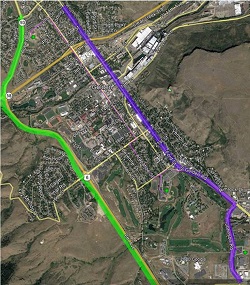
In 2019 the city completed a feasibility study showing that the construction of a full city-owned fiber network would cost $37 million. Instead of tackling the entire project at once, advisers recommended the city proceed in phases, beginning with the construction of a $3.8 million, 10.5 mile fiber ring connecting key community anchor institutions.

This week on the podcast, Christopher is joined by Chad Crager, Broadband Executive Director at City of Fort Collins, to talk about the rapidly maturing city-owned network they call Connexion. From a feasibility study in 2018 to the lion's share of construction completed today, Connexion's story illustrates the value of being nimble when expectations meet reality. When planned use of existing conduit was thwarted by frozen and root-blocked pathways, the city bored new routes. When that led to increased construction costs, the city adjusted its target take rate upwards and hired dedicated, community-minded staff eager to be responsive to subscribers and build a sense of goodwill. And when developers argued they only needed a single fiber to run wireless for new apartment complexes, the city convinced them to plan for more growth in the future.
Along the way, the municipal network has committed to doing its part in the fight for digital equity. This includes the establishment of a fund with 6 percent of network revenues going to support low-cost plans and literacy efforts, to partnering with Larimer County on extending the network outside city limits, and more.
This show is 38 minutes long and can be played on this page or using the podcast app of your choice with this feed.
Transcript below.
We want your feedback and suggestions for the show: please e-mail us or leave a comment below.
Listen to other episodes here or see other podcasts from the Institute for Local Self-Reliance here.
Thanks to Arne Huseby for the music. The song is Warm Duck Shuffle and is licensed under a Creative Commons Attribution (3.0) license.
In January, we released our new census of municipal networks in the United States for 2024, and the significant growth that we've seen over the last two years as more and more cities commit to building Internet infrastructure to add new tools for their local government, incentivize new economic development, and improve connectivity for households.
The trend has not gone unnoticed by the monopoly players and their allies; we've seen new dark-money campaigns on both the East Coast and in the west, as astroturf campaigns and misinformation efforts have increased.
A new short documentary by Light Reading does a great job of outlining the stakes for local governments, residents stuck on poor connections, and the incumbents as the wave of municipal networks grows. Featuring the network in Loveland, Colorado and context by advocates like the American Association for Public Broadband (AAPB) Executive Director Gigi Sohn and Washington State Representative Drew Hansen, it's well worth watching.
Colorado has long been home to some of the most innovative municipal broadband projects in the country. That trend has only accelerated with last year’s voter-approved elimination of municipal broadband restrictions, and it’s now being buoyed by a massive new wave of state grants that should further expand affordable broadband to long-neglected parts of the state.
Colorado Gov. Jared Polis recently announced the first of multiple broadband investments using stimulus funding from the U.S. Treasury’s Capital Projects Fund (CPF) program. The CPF is funded by $10 billion made possible by the American Rescue Plan Act (ARPA), and is a key part of the state’s goal to bring affordable broadband to 99 percent of Colorado residents by 2027.
According to the Governor’s office, the state just authorized $113 million in CPF funds on 13 projects that will bring fiber service to nearly 19,000 homes and businesses across Colorado. State officials say the funding will be heavily focused on projects in the South and Southwest portion of the Centennial State, where connectivity needs are greatest.

The Colorado Broadband Office says it received 112 applications asking for more than $642 million in broadband funding across the state–five times greater than the allotted awards.
Boulder, Colorado officials have issued a new request for proposal (RFP) seeking partners for their ongoing quest to deliver affordable fiber to the city of 104,000.
According to an announcement by Boulder leaders, the city is offering potential partners a long-term lease of city-owned dark-fiber backbone infrastructure and a right of way agreement for the construction and operation of a network delivering Internet service offering 1 Gbps or more to all Boulder homes and businesses. Responses are due by March 1.
When we last checked in with Boulder in April of last year, the city was putting the finishing touches on a $20 million, 65-mile dark fiber backbone, funded by the competitive sale of its 2018 Broadband Taxable Certificates of Participation (COPs). The competitive sale was used to ensure that Boulder could get the lowest interest rates possible in financing the construction of the backbone.
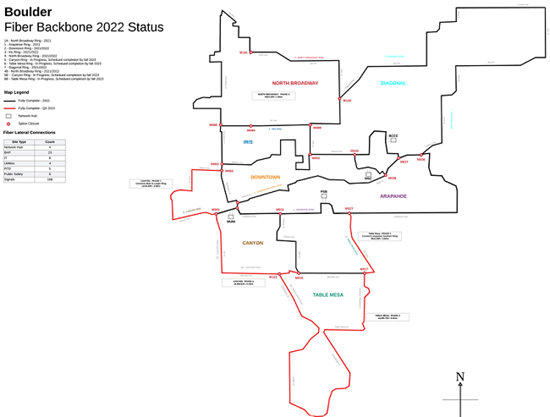
While the process was technically started back in 2018, and then delayed by the pandemic, city officials remained committed to moving the project forward.
“What we are trying to do in Boulder – if we can find the right partner or partners – is about creating more competition; increase the competitive marketplace locally,” project manager and independent consultant Tim Scott told ILSR last year.
Like so many U.S. communities, Boulder sees limited competition between the local cable company (Comcast) and the local phone company (Centurylink/Lumen) resulting in slow speeds, spotty coverage, high prices, and substandard customer service.
Blue River, Colorado (est. pop. 882) is the latest Colorado municipality to explore building its own broadband network with an eye on affordable access. The town is part of a trend that’s only accelerated since the state eliminated industry-backed state level protections restricting community-owned broadband networks.
Just south of Breckenridge in the central part of the state, Blue River is nestled in one of the more rural parts of Summit County. Comcast (Xfinity) enjoys a broadband monopoly, resulting in spotty access, slow speeds, and high prices. Locals also routinely complain that cell phone service remains spotty in much of the mountainous area.
In response, town leaders recently hired the consulting firm, NEO Connect, to explore the possibility of building a town-wide fiber network. According to a feasibility study presented to the Blue River Board of Trustees by Mayor Toby Babich, the construction of a fiber network serving every town resident will cost somewhere in the neighborhood of $13 million.

While that “may seem out of reach,” Babich recently told the board, “we believe with the right funding and partnership we can move forward with this project.”
The estimates for network construction range somewhere between $7 million to $24 million, depending on how much underground trenching work is required.
As Loveland, Colorado’s municipal broadband network continues to rack up industry accolades on its path to providing world-class high-speed Internet service, the city is now celebrating another important milestone.
Last week, Pulse Fiber officials announced that construction of its community-owned broadband network is now complete with every household and business in this city of 77,000 now having access to affordable gig-speed service.
The $110 million construction project, which began in earnest only four years ago, is the largest capital project in the city’s history, reaching the finish line on time and on budget, city officials said.
In a press announcement Steve Adams, Loveland’s City Manager, captured the meaning of the moment:
“As we celebrate the successful conclusion of this historic project, Pulse stands as a shining example of what is possible when the community unites to pioneer innovative, collaborative solutions. We did this for ourselves, and we made it happen together.”
“This infrastructure has been designed and built with future generations in mind, ensuring Loveland remains at the forefront of modern, robust, and future-proof Internet delivery,” Pulse Broadband Manager Brieana Reed-Harmel added.
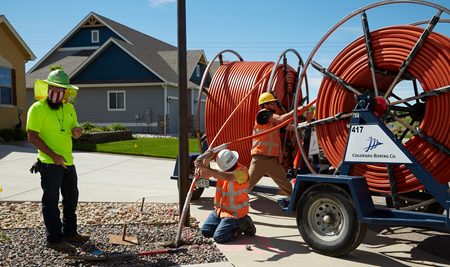
Pulse officials candidly acknowledged that the pathway to the leading edge of Internet connectivity wasn’t easy, as the city had to navigate network construction through a global pandemic, supply chain disruptions, and inflation. But despite those challenges, Pulse Fiber has deployed 631 miles of conduit and over 1,300 miles of fiber throughout the city.